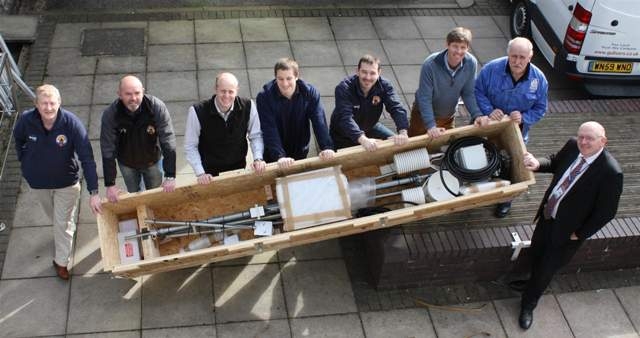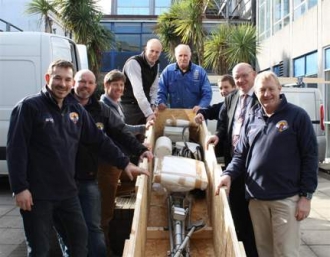
We have received the following Press Release from Cornwall College
The masterminds behind the Bloodhound SuperSonic Car (SSC) have enlisted Falmouth Marine School, a part of Cornwall College, to test a weather centre which is set to be used to monitor conditions trackside in South Africa.
The 170kg state-of-the-art weather station, loaned to the Bloodhound Project team by the Met Office, arrived at the campus in Falmouth this week and will now be assembled by students, with support from the College’s highly skilled staff.
The BLOODHOUND Project is an international education initiative focused around a 1,000 mph World Land Speed Record attempt. The core aim is to inspire young people to pursue careers in Science, Technology, Engineering and Mathematics (STEM) by showcasing these subjects in the most exciting way possible, by building the ultimate racing car.
Bloodhound SSC is powered by a jet engine from a Eurofighter Typhoon and a custom designed hybrid rocket, which together generate over 135,000 horsepower that will blast it down the desert race track at over 1,000 mph in 2013.
When travelling five times faster than an F1 car it is crucial to know precisely what the air pressure, temperature and winds are, as the slightest miscalculation could send the car off course or stop a new world land speed record being achieved.
 After the weather centre has been assembled, local weather data will be sampled and sent to the Met Office to be checked and verified. Once it is established that the system is working as it should be, it will be shipped to the Hakskeen Pan, Northern Cape, South Africa. There, it will be set up on the desert racetrack, to monitor conditions through two weather cycles providing data which will be used to optimise the car’s performance.
After the weather centre has been assembled, local weather data will be sampled and sent to the Met Office to be checked and verified. Once it is established that the system is working as it should be, it will be shipped to the Hakskeen Pan, Northern Cape, South Africa. There, it will be set up on the desert racetrack, to monitor conditions through two weather cycles providing data which will be used to optimise the car’s performance.
Dan Johns, Bloodhound SSC Program Architect, said: "We’re delighted Cornwall College students and staff are able to support the Bloodhound Project. Understanding the weather at the track in South Africa is really important to the success of the 1,000 mph record attempt. Students at Falmouth Marine School will assemble the weather centre lent to the Project by the Met Office and test it in Cornwall’s variable and sometimes wild weather patterns. Following a successful test, in partnership with the Met Office and the Bloodhound engineering team, the weather centre will be sent to South Africa where it will monitor weather at the Hakskeen Pan desert racetrack in the Northern Cape, so we can calculate the very best time to take the Bloodhound supersonic car through the sound barrier and up to 1,000 mph."
Alex Ledbrooke, Cornwall College STEM (Science, Technology, Engineering and Maths) Project Manager, said: “I’m so excited about this project! The Bloodhound adventure is truly inspirational and to be involved is brilliant for the college and for Cornwall. There’s a lot going to happen in the next few years and Cornwall College STEM is going along for the ride.”
David Stedman, Head of Falmouth Marine School, added: “This is an excellent opportunity for our students to be involved in the Bloodhound Project utilising some of the skills taught on our specialist courses.”
Cornish residents and visitors to the county will have the chance to find out more about the Bloodhound Project when a life-size replica of the Super Sonic Car goes on display at Cornwall College Camborne on Sunday 11th March from 2pm to 5pm. The drop-in session is open to the public and will also feature the EJ200 Eurofighter jet engine that will help take the car through the 1,000 mph mark and a chance to have a go on the Bloodhound SSC simulator. The showcase will be followed on Monday 12th March by a bookable lecture by Project Director and former land speed record holder Richard Noble. Tickets for the event, starting at 5.30pm, are available to book from at www.cornwall.ac.uk.
 Josie Scobling, Press Officer for Cornwall College. 23Feb12
Josie Scobling, Press Officer for Cornwall College. 23Feb12


